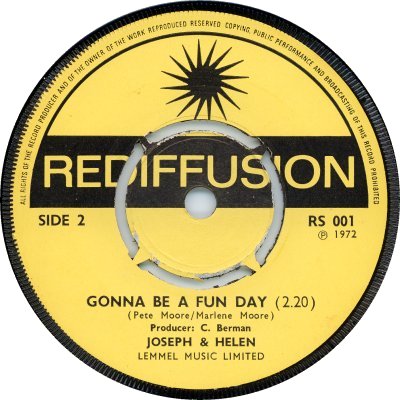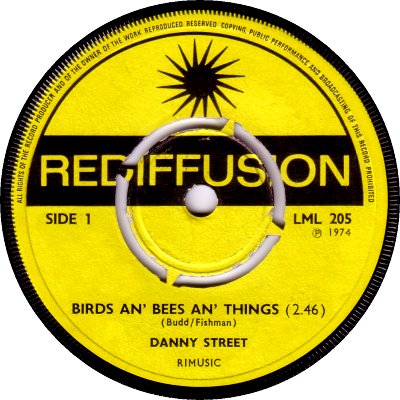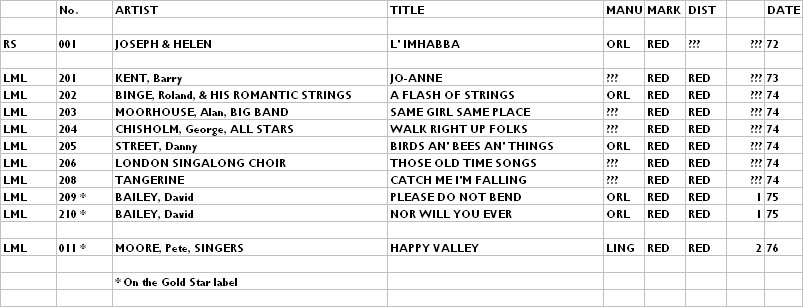

The Rediffusion company had a fairly complicated history dating back to the 1920s, but it only became a household name in the mid '50s when, as Associated-Rediffusion, it became an independent television company broadcasting to the London area. Its interests in music started around 1954 when it set up International Music Services, a library music company. By 1956 this had evolved into Rediffusion Reditune, which supplied background music to supermarkets and the like. Reditune recorded a lot of its own material and eventually spawned Rediffusion International Music, which began to issue records on the RIM label (q.v.). The first releases came in 1967, by which time British Electric Traction held a majority shareholding in the company. Most were budget-priced LPs but there were also some singles. RIM lasted until some point in 1969, when it was replaced by the Rediffusion label. In April 1974 there was a rebranding, with Rediffusion becoming Gold Star (q.v.). This in turn was replaced by a revived and redesigned RIM label in 1979.
Rediffusion received a fair number of mentions in the music press of the late '60s and the '70s. 'Record Retailer' of the 71th of July mentioned that RIM was Rediffusion Reditunes' label, while 'RR' of the 4th of September supplied the information that Philips was going to be taking over distribution of the label later in the month, with RIMs 9, 10 and 11 being the first singles affected by the deal. The article also said that there had been two 'pilot singles' the previous year, which had been handled by the British Independent Record Distributors group - presumably these were RIMs 1 and 2, which were the only releases from 1967. An advert in 'RR' for the 15th of January confirmed that RIM records were still being distributed by Philips, but the issue of the 28th of March 1970 said Rediffusion records were back with BIRD again at that point. 'RR' 4th of April corrected that claim and said that only distributor Keith Prowse was currently on board, with the others still being involved in negotiations. By October 1972 Rediffusion was doing its own sales and distribution, according to 'Music Week' of the 14th. The company had ambitions: 'MW' of the 24th of November 1973 reported that it was to open its own pressing plant in South Wales early the following year; the new plant would augment the current pressing arrangements with Orlake and British Homophone. 'MW' of the 19th of January 1974 said that the plant was due to open in March, and the Rediffusion would need all its capacity for its own products. There was a slight delay - 'MW' of the 6th of April reported that the plant would open 'shortly', and added that Orlake would still be contracted to do some pressings. Finally, on the 6th of July, 'MW' was able to announce that the plant had opened. The presses were projected to turn out 750,000 LPs during the coming twelve months.
Matters seem to have run unremarkably for several years, and it wasn't until 1978 that 'MW' had anything further to report about Rediffusion. An article in the issue of the 8th of July of that year broke the news that the company, which had emphasized Classical music in the past (through its album-only Legend, Aurora, Royale and Heritage labels) was aiming to broaden its repertoire by bringing in more MOR and 'commercial' material. Classical music wasn't neglected, though, and March 1979 saw the release of five 7" records on the new 'Classical Pops' label (q.v.). March also saw the introduction of the revamped RIM label. Later in the year a new 'Pop' label, Fusion was introduced, to sit alongside the MOR-orientated RIM. 'MW' of the 2nd of June 1979 was able to announce that Rediffusion had signed a distribution deal with Pinnacle for all of its labels - RIM, Fusion and Classical Pops - with effect from the 1st of that month, with licensed label Supraphon joining them in September; in the event the first Fusion records didn't actually come out till the 21st of September ('MW', 22nd). Sadly, however, all this activity was destined to lead to nothing much. 'MW' of the 19th of January 1980 reported that Rediffusion was phasing out its record labels and would not be producing any more repertoire.
The company's focus was always on albums, but it did put out a dozen singles on its Rediffusion and Gold Star labels. As most of them shared a common LML-200 numerical series I've listed them together, below. Singles on RIM are listed separately on the appropriate page. The first Rediffusion single came out in 1972 and featured Malta's entry for that year's Eurovision Song Contest, 'L-Imhabba' b/w 'Gonna Be A Fun Day', by Joseph & Helen. It was numbered RS-001 (1). A more sustained attempt at the singles market began in 1974, with records numbered in the LML-200s; the label design remained the same (2). After the rebranding as Gold Star (q.v.) the LML-200 numbering was retained for a while, though the '2' was replaced by a '0' for the final release. The fare on offer seems to have been the same sort of Easy Listening / Lounge music which was featured on the albums, and none of the records ever came close to tickling the Charts. The few Rediffusion singles I've seen in the vinyl have been Orlake pressings, and the company's singles from the late '70s on Rim, Flight and Fusion, were pressed by Lyntone, which suggests that the Caerphilly plant may have been used solely for the manufacture of albums.



Copyright 2006 Robert Lyons.

